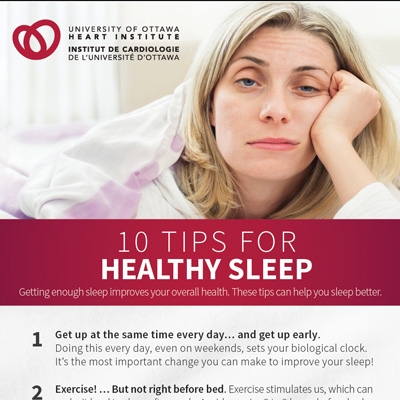A good night’s sleep is important for a healthy heart. In fact, studies show that poor quality sleep increases your risk of developing cardiovascular disease and can be a point of concern for those living with cardiovascular disease.

Trouble sleeping, or insomnia, is a common complaint, according to Ottawa Heart Institute psychologists Heather Tulloch, PhD, and Adam Heenan, PhD. One out of four adults is dissatisfied with the quality of their sleep, and 10% of adults have insomnia. The numbers jump to 30% to 40% for people with heart disease.
Normally, people fall asleep within 30 minutes or less and sleep between six and nine hours per night—the amount of sleep needed by a given person varies by age and activity level. But people with insomnia have trouble falling asleep, staying asleep, or they wake up in the middle of the night and are unable to fall back to sleep.
These people tend to get short chunks of sleep that aren’t enough to be fully rested. Their disrupted sleep patterns lead to feeling drowsy and fuzzy-headed when they are up and about, Dr. Tulloch said.
Why Sleep Is Important for Your Heart
Contrary to what many people might think, sleep isn’t about the body shutting down; it’s an active state vital for regulating many physiological functions.
During the deepest stages of sleep, blood pressure drops, the muscles relax and the body’s general repair processes occur. In deep sleep, the body releases various hormones that affect growth, appetite regulation, energy metabolism and glucose processing, as well as brain and muscle health.
Lack of sleep interrupts these effects which disrupts the body’s chemical and hormonal balance. Levels of cortisol (a stress hormone), insulin and other chemicals increase, contributing to a greater risk of diabetes, metabolic syndrome, dementia-related conditions such as Alzheimer’s disease, and cardiovascular disease.
And in people who already have hypertension, a single night of poor sleep can cause an increase in blood pressure the following day.

While addressing sleep problems helps to prevent heart disease, getting healthy sleep is important for people who already have heart disease. According to Dr. Heenan, it’s common for people who have had a cardiac event, such as a heart attack, to develop sleep problems even if they weren’t prone to them before. In fact, cardiac patients have insomnia rates two to three times higher than the general population.
A recent diagnosis of cardiovascular disease or a recent heart attack can lead to anxiety, depression, worry and related stresses that can keep a person awake.
“Some people find that once they go to bed, their mind races because of worry about their condition. Some people fear that, if they go to sleep, they might not wake up. Others perceive a heart event as a death sentence and worry about the well-being of their family if they die. Bed becomes a place of dread,” Dr. Heenan said.
Getting the Rest You Need
The good news is there are effective ways to deal with insomnia. Dr. Tulloch notes the Canadian Association of Cardiac Rehabilitation guidelines suggest all cardiac patients be screened and assessed for sleep problems. Assessments can identify the cause of sleep disturbances, be it sleep apnea, issues relating to poor sleep habits, worry or other causes.

To give people with sleep issues practical information they can use themselves, Drs. Tulloch and Heenan have developed “10 Tips for Healthy Sleep” (pdf). A video that explores sleep-related issues and solutions for better sleep, will be available online through the Heart Institute later this spring.
At the Ottawa Heart Institute, all cardiac patients will soon be screened for sleep problems, and those who need it can participate in the Heart Healthy Sleep Group. This is a six-week program that uses cognitive behaviour therapy (CBT) for insomnia to address both emotional and behavioural factors that contribute to restless nights.
A big part of improving sleep patterns is changing the routines we have around bed time, as well as learning methods to control thoughts that cause us anxiety or worry.
“It’s a good news story,” said Dr. Tulloch. “Lack of sleep can be dealt with, and many patients find they no longer need sleeping pills.”
Studies show that CBT for insomnia helps 70% to 80% of patients. It has the advantage of being an alternative to adding sleeping pills to your medication arsenal. CBT for insomnia is known to help people fall sleep faster, experience better sleep quality and even get more total sleep time per night.

